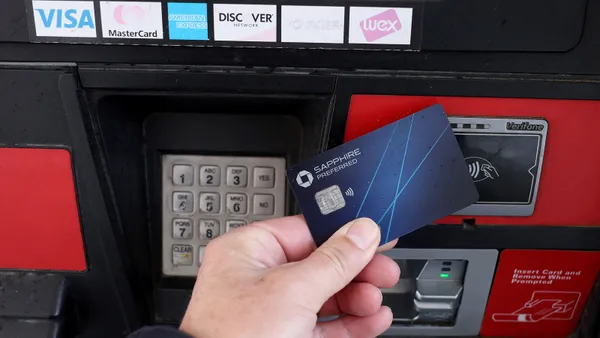Dive Brief:
- Visa filed its formal response Thursday to the U.S. Department of Justice’s 2024 debit card antitrust lawsuit, denying claims that it operates an illegal monopoly in the U.S. debit card market.
- “Visa had legitimate business justifications for the conduct at issue, including in response to the Durbin Amendment and the new regulations impacting the industry, its conduct was procompetitive and outweighed any alleged anticompetitive effects, and its practices were and are reasonably justified,” the filing said.
- Separately, the plaintiffs and defendants filed a revised schedule Thursday for managing the case, with the fact discovery process ending March 17, 2026, and expert witness discovery ending Aug. 7. No witness should be deposed more than once, U.S. District Judge John Koeltl in New York City ruled last month.
Dive Insight:
The complaint alleges that Visa, the biggest U.S. card network, operates an illegal monopoly in the market for debit card payments, and “wields its dominance, enormous scale, and centrality” to impose agreements on merchants and banks that exclude potential competitors from debit processing, the Justice Department said when it filed the complaint.
The answer from Visa, which also routes credit card transactions, to the lawsuit came about five weeks after the company lost its bid to have the case dismissed.
The Justice Department brought the lawsuit in September under then-Attorney General Merrick Garland during the Biden administration.
Koeltl denied Visa’s motion to dismiss the lawsuit on June 24, finding that the government’s allegations were plausible and that a dismissal would be premature. In its filing Thursday, Visa again asked Koeltl to dismiss the complaint with prejudice and enter judgement in its favor.
According to the lawsuit, Visa also struck agreements with various fintech firms to prevent them from entering debit market competition.
“Visa has no agreements that pay competitors not to compete or agreements that pay potential competitors not to develop alternatives to debit card networks or adopt technologies to disintermediate debit card networks,” the company said in the filing.
San Francisco-based Visa handles more than 60% of U.S. debit card transactions on its network, collecting more than $7 billion annually in processing fees, according to the federal government’s complaint. Mastercard is a distant second in the market, with less than a quarter of the debit-processing market, the lawsuit said.
Visa said its contracts with issuers and acquirers “are pro-competitive discounting arrangements, are reflective of common industry practices, are responsive to demands from sophisticated customers” and have not stymied competition.
The case is being heard in the U.S. District Court for the Southern District of New York.













